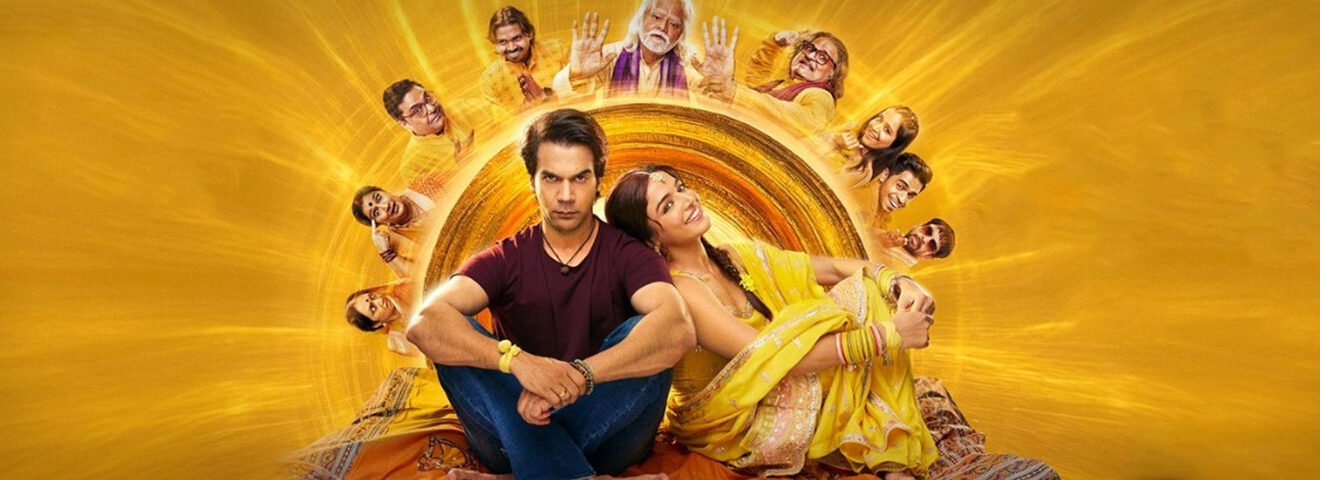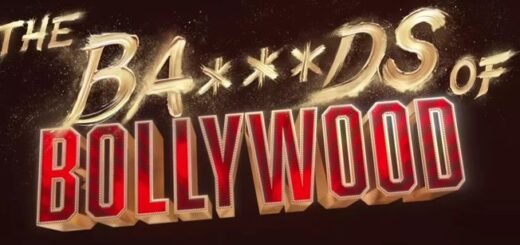Bhool Chuk Maaf Review – A Time-Loop Romance

Bhool Chuk Maaf, a romantic comedy directed by Karan Sharma, explores love, regret, and second chances through an inventive time-loop concept. The film stars the ever-reliable Rajkummar Rao and the vivacious Wamiqa Gabbi in lead roles. Set in the vibrant spiritual city of Varanasi, the story carries the ambition to blend a small-town romance with a science fiction twist.
However, despite its promising premise and sincere performances, the film stumbles in execution. Sharma attempts to deliver a heartfelt story with an innovative narrative structure, but his direction often drifts into the inconsistent and the underwhelming. The audience experiences a whirlwind of emotions without a firm anchor in character depth or storytelling coherence.
Plot Summary
Ranjan (Rajkummar Rao) plays a middle-class government employee who believes he has achieved the ultimate dream — landing a secure job and winning the heart of Titli (Wamiqa Gabbi), a lively and ambitious young woman. As their wedding approaches, Ranjan starts reliving the same day repeatedly. The time-loop begins on the day before the wedding, forcing him to confront fears, doubts, and insecurities that he had buried beneath the joy of impending matrimony.
Each iteration of the day pushes Ranjan into emotional and moral dilemmas. He questions his readiness for marriage, re-evaluates his relationship with Titli, and explores alternate choices he could make. Unlike typical rom-coms, this film leans into self-exploration and regret as major themes.
Unfortunately, Titli remains unaware of the loop. Her character does not evolve in sync with Ranjan’s, creating a narrative imbalance. The film uses the time loop to examine love, destiny, and the consequences of our decisions — but it never fully fleshes out its ideas.
Performances
Rajkummar Rao carries the emotional weight of the story with his trademark sincerity. He dives into the role of Ranjan with genuine conviction. He delivers the neurotic energy, comic timing, and emotional vulnerability that audiences have come to expect from him. However, the script restricts him. It fails to give his character a broader emotional arc. Ranjan mostly reacts to circumstances without growing in meaningful ways.
Wamiqa Gabbi lights up the screen with her presence. She brings charisma, humor, and emotional depth to Titli — whenever the script allows her to. Unfortunately, the film sidelines her character development in favor of Ranjan’s emotional journey. Gabbi has the potential to match Rao’s intensity, but the screenplay limits her impact.
Supporting actors offer brief moments of entertainment but rarely rise beyond caricatures. The film presents them as comic relief or narrative tools rather than rounded personalities.
Direction and Screenplay
Director Karan Sharma tries to merge mainstream Bollywood romance with speculative fiction. He sets his story in a culturally rich environment like Varanasi and infuses it with philosophical overtones. However, he does not commit to either genre with full confidence.
Sharma uses the time-loop trope to explore multiple “what if” scenarios, but the execution remains superficial. He fails to develop tension, conflict, or emotional payoff across the iterations. While the premise offers immense creative potential, Sharma plays it too safe.
The screenplay moves in circles — quite literally. Instead of building complexity with each loop, the narrative resets without learning much from the previous events. Repetition becomes tedious, and the emotional stakes stay flat. The film spends too much time setting up gimmicks and too little time deepening character connections.
Cinematography and Visuals
Sudeep Chatterjee’s cinematography stands out as one of the film’s stronger elements. He captures Varanasi’s ghats, narrow alleys, and riverfront beauty with elegance and warmth. The camera lingers on colors, textures, and expressions that reflect the emotional and spiritual themes of the film.
Visually, the film maintains a romantic tone. The use of natural light, religious symbols, and urban chaos adds authenticity. Chatterjee makes Varanasi feel like a living character in the story — present, mysterious, and ever-changing.
Music and Background Score
The music, composed by Tanishk Bagchi, offers a mix of upbeat romantic numbers and soulful ballads. “Chor Bazaari Phir Se” delivers playful energy, while “Koi Naa” captures introspection and longing. Irshad Kamil’s lyrics explore the complexity of modern relationships with poetic undertones.
The background score complements the film’s whimsical tone but does not elevate the emotional moments. While the songs create atmosphere, they do not linger in memory. They serve the narrative but never transcend it.
Critical Reception
Critics responded with mixed to negative reviews. The Times of India gave it a moderate 3 out of 5 stars, appreciating the ambition but pointing out the inconsistency in tone. The review praised the performances and visual richness but criticized the plot’s repetitiveness.
NDTV and Indian Express took a harsher stance. They called the film a confused attempt to be both a romantic drama and a speculative thriller. Critics labeled it a “mystifying mish-mash of genres” and a “poor man’s Brahmastra.” The latter remark highlighted the film’s overuse of effects without sufficient narrative grounding.
Box Office Report
On its opening day, Bhool Chuk Maaf earned ₹4.62 crore across India. The film witnessed a late surge in advance bookings — up 137% in the final 24 hours before release — but failed to sustain momentum. Despite star power and media buzz, the film struggled to draw audiences in a competitive box office environment.
The numbers place it among the lower-grossing releases of 2025’s first half, raising questions about the audience’s appetite for experimental storytelling wrapped in commercial packaging.
Controversy and Release Saga
Originally scheduled for a theatrical release on May 9, 2025, the film faced unexpected delays due to national security concerns. The producers opted for an OTT premiere instead, choosing Amazon Prime Video. However, PVR Inox challenged this move legally, insisting on an exclusive theatrical release first.
A court ruling favored PVR Inox, compelling the producers to release Bhool Chuk Maaf in theaters on May 23, 2025. The OTT release now stands postponed to June 6, 2025. This legal drama added publicity but may have also disrupted the film’s marketing rhythm.
Conclusion
Bhool Chuk Maaf starts with a clever idea and a talented cast but does not follow through. It raises questions about love, fate, and second chances but offers shallow answers. The film entertains sporadically but never captivates fully. While the direction shows ambition, the storytelling lacks courage and clarity.
Rajkummar Rao and Wamiqa Gabbi do their best to keep the film afloat. The cinematography and setting provide a strong visual foundation. Yet, the film cannot overcome its script’s indecision and underdeveloped themes.
In the end, Bhool Chuk Maaf becomes a forgettable affair — a film with heart but no backbone.
Rating: 2.5 out of 5













